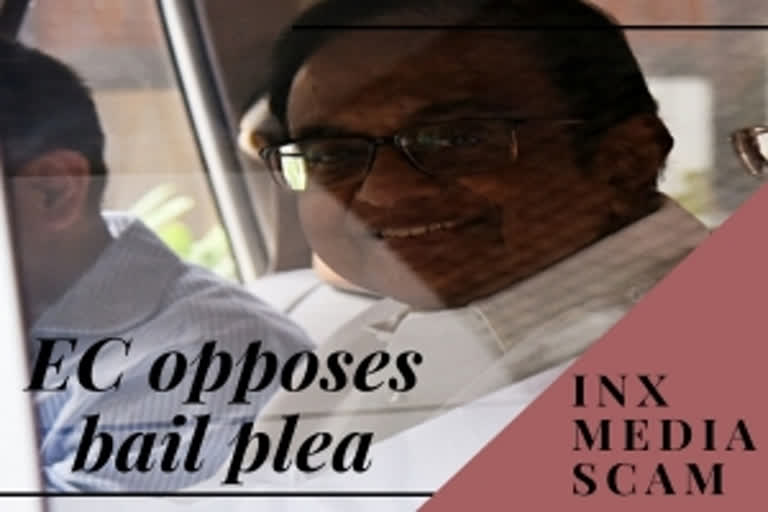New Delhi: The ED on Tuesday opposed in the Supreme Court the bail plea of Congress leader P Chidambaram in the INX Media money laundering case claiming that he used the 'influential office' of finance minister for 'personal gains' and laundered proceeds of crime to conceal 'tainted money'.
In a counter-affidavit filed in the apex court, the Enforcement Directorate (ED) alleged that Chidambaram is not entitled to bail as sufficient evidence has come on record that he has been 'indulging in the destruction of evidence' and influencing the witnesses.
Chidambaram, being a former cabinet minister, is 'very intelligent and influential man', the ED claimed, adding that his mere presence can intimidate witnesses at this stage and there is direct evidence which shows that he has pressurised the witnesses to not join the investigation.
"In the present case the petitioner (Chidambaram) who held a very high and influential office of the finance minister of the country, used the same for personal gains, personally, as well as in connivance with his co-conspirators and has laundered the proceeds of crime to conceal the tainted money," the ED said.
The 74-year-old former finance minister has approached the apex court challenging the Delhi High Court November 15 verdict which denied him bail in the INX Media money laundering case.
Read:| Train services resume fully in Kashmir Valley
The matter was listed for hearing on Tuesday before a bench headed by Justice R Banumathi who adjourned it for Wednesday as Solicitor General Tushar Mehta, who is appearing for the ED, was busy arguing in a separate matter before another bench of the top court.
In its affidavit, the ED alleged that the 'brazenness and impunity' with which the high office of country was misused by Chidambaram for personal gains does not entitle him for relief as it would not only be against the 'zero-tolerance policy on corruption' of the court and the country but would also be "setting a very wrong precedence in all corruption cases".
"The present case is a case of economic offence which itself constitutes a class apart and is considered to be the gravest offence cutting the very root of purity and probity of public administration," it said.
"The nature of the offence, the brazenness and the impunity with which the high public office was abused by the petitioner/accused of personal gains again disentitles him from seeking bail," the affidavit said.
The agency further alleged there are statements of three witnesses who have stated that they have been 'approached /influenced/tutored/pressurised not to participate in the investigations and disclose any facts to ED.
"An attempt to influence key witnesses of the case to retract from their statement has already been made by the petitioner/accused, if enlarged on bail, it is the bonafide belief of the respondent investigating agency that another attempt would be made by the petitioner/ accused through indirect means to influence the witnesses so as to thwart the course of justice," it said.
Read:| Centre planning to come up with lottery scheme for GST paying customers
The ED claimed that probe has also resulted in the gathering of 'substantial material' showing a clear case of money laundering with the involvement of Chidambaram, his son Karti Chidambaram and their co-conspirators.
It alleged it has been found that Chidambaram, along with his close confidants and co-conspirators, 'cleverly created a web of shell companies both in India and in many other countries for routing/layering and laundering proceeds of crime'.
It claimed that persons incorporating shell companies in India and abroad were close to Chidambaram and they have credible evidence to substantiate it.
"It is respectfully submitted that as a step in the offence of money laundering, two individuals are found to have acted as agents of the petitioner and interacted/liasoned with the parties applying for FIPB approval including INX-Media as well as collected the proceeds of crime on behalf of/at the behest of the petitioner," the affidavit alleged.
It alleged that proceeds of crime were used for making deposits in "various Benami bank accounts and making Benami investments in movable and immovable properties both in India and mainly outside India".
Read:| Eleven years of 26/11: A flashback of the dark chapter
"After the irregularity in FIPB approval in several cases including INX Media came to the public domain, several changes were made to the shareholding pattern of shell companies in which proceeds of crime were deposited in order to conceal real ownership," it said.
The ED claimed that to conceal the proceeds of crime, the earlier bank accounts were closed and new bank accounts were opened.
"Investigations have revealed that two bank accounts of the son of the petitioner in Metro Bank, UK were closed. Later on, some new accounts were opened in different banks by Karti, P Chidambaram and other conspirators," it said.
Chidambaram's counsel had earlier said he has been in custody for over 90 days and the high court has noted in its verdict that he is neither a flight risk nor can he influence the witnesses or tamper with the evidence.
Chidambaram was first arrested by the CBI on August 21 in the INX Media corruption case and was granted bail by the Supreme Court on October 22.
He was arrested by the ED in the money laundering case on October 16 and is in judicial custody.
The CBI registered its case on May 15, 2017, alleging irregularities in a Foreign Investment Promotion Board (FIPB) clearance granted to the INX Media group for receiving overseas funds of Rs 305 crore in 2007, during Chidambaram's tenure as finance minister.
Thereafter, the ED lodged a money-laundering case.
Read:| Government's support price turns sour for needy farmers



